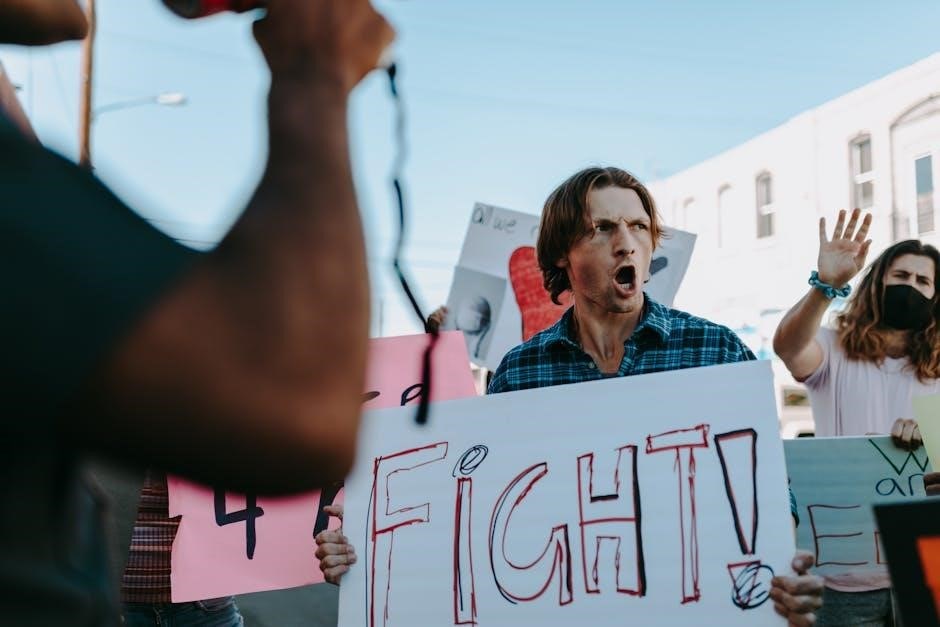We the People: The Citizen and the Constitution is a nationally recognized civic education program developed in 1987. It focuses on constitutional principles, rights, and civic responsibilities, preparing students for active citizenship through engaging lessons and interactive strategies.
Overview of the Program
We the People: The Citizen and the Constitution is a civic education program developed by the Center for Civic Education. It focuses on teaching the history, principles, and evolution of the U.S. Constitution and Bill of Rights. The program includes 40 lessons divided into six units, covering topics such as constitutional foundations, rights expansion, and civic responsibilities. Interactive strategies like simulated congressional hearings and cooperative learning make the program engaging for students, fostering civic competence and active citizenship.
Importance of Civic Education in Modern Society
Civic education is essential for fostering informed and active citizenship in modern society. Programs like We the People equip students with critical thinking skills and a deep understanding of constitutional principles. By engaging with the Constitution and Bill of Rights, students develop the ability to participate meaningfully in democracy, ensuring the preservation of freedom and justice for future generations. This education empowers individuals to navigate complex societal issues and contribute to a functioning democracy.

Historical Background of the Program
We the People: The Citizen and the Constitution was developed in 1987 by the Center for Civic Education and adopted by the U.S. Constitution Bicentennial Commission, chaired by Chief Justice Warren E. Burger.
Development in 1987 and Adoption by the U.S. Constitution Bicentennial Commission
The program was developed in 1987 by the Center for Civic Education and adopted as the U;S. Constitution Bicentennial Commission’s flagship education program. Chaired by Chief Justice Warren E. Burger, the Commission recognized its value in promoting constitutional literacy. The program was designed to coincide with the bicentennial celebration of the U.S. Constitution, emphasizing its enduring relevance and the importance of civic education for future generations.
Role of Chief Justice Warren E. Burger in Promoting Civic Education
Chief Justice Warren E. Burger played a pivotal role in advancing civic education by chairing the U.S. Constitution Bicentennial Commission. He championed the development of We the People: The Citizen and the Constitution, recognizing its potential to instill constitutional literacy and civic responsibility. His leadership ensured the program’s adoption and widespread implementation, leaving a lasting legacy in American civic education and fostering a deeper understanding of constitutional principles among students nationwide.

Structure of the Curriculum
We the People features 6 units and 40 lessons, emphasizing interactive strategies like simulated hearings, cooperative learning, and critical thinking. Themes include constitutional rights, civic duties, and democratic principles.
6 Units and 40 Lessons: Key Themes and Objectives
The program is divided into 6 units and 40 lessons, covering foundational topics such as the historical and philosophical origins of constitutional government, the creation and development of the U.S. Constitution, and the expansion of constitutional rights. Lessons focus on critical thinking and cooperative learning, with themes like natural rights, representative government, and civic responsibilities. The curriculum aims to foster a deep understanding of American democracy and active citizenship.
Interactive Strategies: Simulated Congressional Hearings and Cooperative Learning
The program incorporates interactive strategies like simulated congressional hearings, where students testify before panels, demonstrating their understanding of constitutional principles. Cooperative learning encourages collaboration, fostering critical thinking and civic engagement. These active-learning approaches make complex concepts engaging and relevant, preparing students to participate effectively in democratic processes.

Key Concepts and Lessons
The program explores foundational topics such as constitutional government, the creation and evolution of the U.S. Constitution, and the expansion of rights and civic duties.
Historical and Philosophical Foundations of Constitutional Government
This section explores the origins of constitutional government, tracing ideas from natural rights to Enlightenment philosophies. It examines Britain’s influence on representative government and the Declaration of Independence’s role in shaping American principles. Students learn how these foundations laid the groundwork for the U.S. Constitution, emphasizing the balance between individual liberties and collective governance. Critical thinking exercises help students connect historical concepts to modern civic responsibilities.
Creation and Development of the U.S. Constitution
The U.S. Constitution was drafted during the Constitutional Convention in 1787, with the Federalists and Anti-Federalists debating its framework. The document established a federal system with three branches of government and a system of checks and balances. Ratified in 1788, it was later complemented by the Bill of Rights in 1791, ensuring individual liberties. This foundational document has undergone amendments, reflecting the nation’s evolving values and legal framework.
Expansion of Constitutional Rights and Civic Responsibilities
The Constitution’s amendments, particularly the Bill of Rights and later additions, expanded individual freedoms and civic duties. The 13th Amendment abolished slavery, while the 19th granted women the right to vote. The Civil Rights Movement further advanced constitutional rights, emphasizing equality and justice. Civic responsibilities include voting, jury service, and active participation in democracy, fostering a society where citizens engage in shaping their governance and upholding constitutional principles through informed decisions and community involvement.

Engagement and Learning Tools
Enhanced e-books and interactive strategies, such as simulated congressional hearings, engage students. These tools make learning about the Constitution accessible and dynamic for today’s learners.
Enhanced E-Books and Digital Resources for Modern Students
We the People offers enhanced e-books with interactive features like clickable maps, videos, and Supreme Court cases. Digital resources engage students with multimedia content, fostering deeper understanding of constitutional principles. These tools align with modern learning preferences, making civic education accessible and dynamic. The program’s digital platform supports teachers with flexible lesson plans and supplementary materials, ensuring a comprehensive and engaging learning experience for all students.
Role of the Simulated Congressional Hearing in Active Learning
The simulated congressional hearing is a cornerstone of We the People, fostering active learning through student participation. Students testify before a panel, demonstrating understanding of constitutional principles and civic responsibilities. This dynamic activity enhances critical thinking, public speaking, and teamwork, preparing students for real-world civic engagement. It culminates their learning journey, reinforcing key concepts and fostering a deeper connection to the Constitution and its relevance in modern society.

Impact on Students and Educators
We the People fosters civic competence and responsibility in students, enhancing critical thinking, public speaking, and teamwork. It empowers educators with interactive strategies, promoting engagement and deeper understanding of constitutional principles.
Building Civic Competence and Responsibility
We the People equips students with essential civic knowledge and skills, fostering responsibility and active participation. Through interactive strategies like simulated hearings, students develop critical thinking and teamwork. The program emphasizes understanding constitutional rights, fostering informed decision-making, and nurturing engaged citizens. Educators report improved student confidence and civic awareness, preparing the next generation for meaningful contributions to democracy and society.
Enhancing Critical Thinking and Civic Engagement Skills
We the People enhances critical thinking by engaging students in analyzing constitutional issues and applying principles to real-world scenarios. Interactive strategies like simulated congressional hearings encourage articulation of ideas, fostering civic engagement. Cooperative learning promotes collaboration, while lesson exercises refine problem-solving skills. These activities prepare students to address societal challenges thoughtfully, equipping them with the skills to actively participate in democracy and advocate for justice and equality in their communities.

Evolution and Updates
We the People has undergone revisions, incorporating new Supreme Court cases and contemporary issues. The fourth edition features updated content, ensuring relevance and alignment with modern civic education standards.
Revised Editions: Incorporating New Supreme Court Cases and Contemporary Issues
The revised editions of We the People integrate new Supreme Court cases and current societal issues, ensuring the curriculum remains relevant. Updates include recent rulings on civil liberties, technological advancements, and shifting cultural norms. These changes reflect the evolving nature of constitutional law and prepare students to engage with modern civic challenges. Enhanced content fosters critical thinking and equips learners with practical knowledge for informed citizenship.
Alignment with National Civic Education Standards
We the People aligns with national civic education standards, emphasizing constitutional literacy, civic competence, and critical thinking. The curriculum ensures students understand foundational principles of democracy, rights, and responsibilities. By meeting these standards, the program equips learners with essential skills to engage meaningfully in civic life, fostering informed and active citizenship for future generations.

Recognition and Awards
We the People has earned national acclaim for its impact on civic education. The program features state and national competitions, showcasing students’ constitutional knowledge and civic engagement skills.
National and State-Level Competitions: We the People State Finals
We the People State Finals bring together students from across the nation to demonstrate their understanding of constitutional principles. These competitions, held annually, feature simulated congressional hearings where students testify on constitutional issues. Notable events include Wyoming’s State Finals at the Capitol and Milford High School’s repeated success. The program fosters civic knowledge and critical thinking, preparing students for active citizenship while recognizing their achievements in constitutional education.
Success Stories: High School Students’ Achievements in Civic Education
High school students in the We the People program have demonstrated exceptional civic knowledge. For instance, Milford High School secured first place in state finals, showcasing their mastery of constitutional principles. These achievements highlight the program’s effectiveness in fostering civic competence and critical thinking. Students’ success reflects their deep understanding of constitutional rights and responsibilities, preparing them to engage actively in democracy.

Future of Civic Education
The future of civic education lies in innovative programs like We the People, which adapt to modern challenges while fostering constitutional literacy and active citizenship.
Challenges and Opportunities in Teaching Constitutional Literacy
Teaching constitutional literacy faces challenges like keeping content relevant and engaging modern students; However, programs like We the People offer opportunities to enhance civic education through interactive strategies and updated resources, ensuring students grasp constitutional principles and their real-world applications. By incorporating digital tools and Supreme Court cases, educators can foster critical thinking and prepare students for active citizenship in a rapidly changing society.
The Role of “We the People” in Shaping Future Citizens
We the People plays a pivotal role in shaping future citizens by fostering civic competence and responsibility. The program’s interactive curriculum and simulated congressional hearings empower students to understand constitutional principles, engage critically, and develop leadership skills. By equipping young people with knowledge of their rights and duties, the program inspires active participation in democracy, ensuring the next generation is prepared to uphold and strengthen constitutional values in America.
We the People: The Citizen and the Constitution is a cornerstone of civic education, fostering constitutional awareness and active citizenship. Its enduring impact ensures future generations uphold democratic values.
Summarizing the Program’s Contribution to Civic Education
We the People: The Citizen and the Constitution has profoundly impacted civic education by fostering constitutional literacy, critical thinking, and active citizenship. Its structured curriculum, interactive strategies, and emphasis on real-world applications empower students to understand their roles in democracy. The program’s recognition through national competitions and its alignment with civic education standards underscore its effectiveness in preparing future generations to engage meaningfully in civic life.
Call to Action: Promoting Constitutional Awareness and Active Citizenship
Educators and students are urged to embrace We the People: The Citizen and the Constitution to foster a deeper understanding of constitutional principles and civic duties. By engaging with its interactive strategies and real-world applications, individuals can become informed and active citizens. Advocate for this program in schools and communities to empower future generations with the knowledge and skills to uphold democracy and contribute meaningfully to society.
